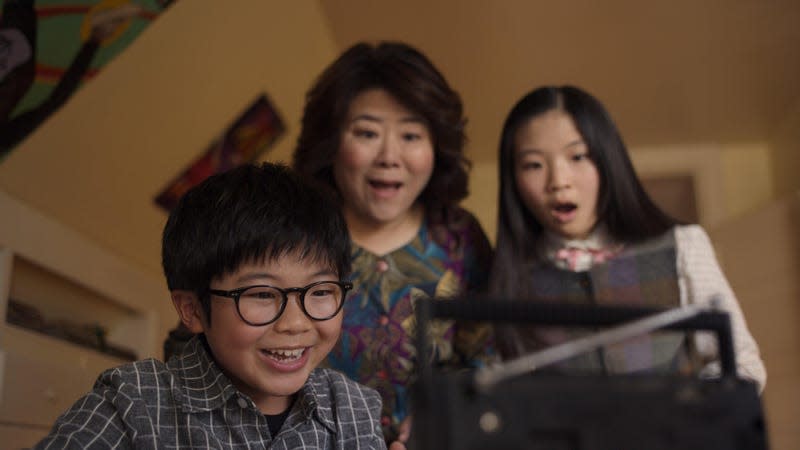Apple TV Plus' Little America returns with a moving, profound season 2

- Oops!Something went wrong.Please try again later.
- Oops!Something went wrong.Please try again later.
- Oops!Something went wrong.Please try again later.
- Oops!Something went wrong.Please try again later.
- Oops!Something went wrong.Please try again later.
- Oops!Something went wrong.Please try again later.
- Oops!Something went wrong.Please try again later.
Little America kicked off in early 2020 when Apple TV+ had existed for roughly two months and had barely carved a space in the streaming era. Sure, the platform boasted big names in the lousy The Morning Show and cult favorites like For All Mankind and Dickinson, but that was about it. In the almost three years since, it has emerged as a surprise hit that houses momentous, Emmy-winning TV shows like Ted Lasso and Severance. All that to say, the streamer has only evolved since the underrated first season of Little America premiered. In reviewing it back then, The A.V. Club dubbed it “Apple TV Plus’ best series to date.” The competition might have elevated for its sophomore run, but Little America thankfully remains a vital treasure in the TV landscape.
Much like the initial season, this anthology returns with eight installments inspired by true stories published in Epic magazine. Each one follows a different protagonist grappling with assimilation problems—forms of prejudice, nostalgia for their homeland and family, or crushing legal issues. As fraught as that sounds, Little America often explores these themes with subtle joy. There’s a conscious effort to not focus solely on the sorrows or hardships of immigration, which is the show’s secret winning formula.
Read more
Set in various cities and time periods across the country, depicting different cultures, the narratives range from heartbreaking to inspiring. But the underlying genesis is the same: What does the concept of “the American dream” mean for immigrants? It’s a particularly timely question, and Little America offers a glimpse of the answer.
Co-created by Kumail Nanjiani, Emily V. Gordon, and Lee Eisenberg, the series is striking because of how much story is moved along in a half-hour without feeling overstuffed. The script and cinematography are immersive, whether the setting is a Minnesota state fair, a New York City fried chicken restaurant, or a lavish Beverly Hills mansion. Some outings undoubtedly hit harder than the others, but season two doesn’t have a weak episode overall. (And since it’s an anthology, it doesn’t need to be watched in a specific order).
However, Little America returns with three powerful outings right away. The premiere charts the hesitant career journey of Korean American Luke Song (Ki Hong Lee), who grew up helping his dutiful mother run a successful hat shop in Detroit. Despite being creative at heart, he attends medical school under parental pressure in a stereotype associated with Asian immigrants that’s addressed head-on. “We came here to give you an opportunity,” Luke’s father tells his son when he brings up quitting medicine, not realizing that pursuing art is an opportunity in its own right. [For those unaware: the real-life Song went on to design hats for Aretha Franklin, including the memorable one she wore to President Obama’s inauguration.]
Familial dynamics, especially emotional parent-child relationships, is a stunning thread that connects several episodes. In the second, Ines (Stacy Rose) is a successful Brooklyn bra seller, but flashbacks reveal how she rose to fame by starting out as a nanny for an Orthodox Jewish household after moving from Belize. Mfoniso Udofia’s exceptional writing captures Ines’ palpable dilemma of adjusting to her new life while longing for the young daughter she left behind. There’s also the added twist of how Ines will never actually be part of the white family she works for, she’s always going to be seen as “the help.”
Similarly, episode three follows Sri Lankan American Sachini (Isuri Wijesundara) participating in a distressing competition to win a car. She’s internally hoping to impress her father, who quit a respectable engineering job to move his family to Texas years ago in hopes of a better lifestyle for Sachini. This throughline of first-generation immigrants’ sacrifice versus their kids’ desires is a veritable reality that Little America ruminates on perfectly.
Little America — Season 2 Official Trailer | Apple TV+
The remaining episodes are also impressive, tackling timelier stories like that of an Afghan refugee aiming to play piano professionally and working with a lawyer to bring his mother out of the Taliban regime. The sixth one recalls Prime Video’s A League Of Their Own, where Japanese immigrant and happily married Yoshiko (Shiori Ideta, a breakout performer) returns to her first love of baseball. Teresa Ruiz and Victoria Canal wrap it up with evocative work in the finale, playing sisters who approach their American life with opposing mindsets.
Little America doesn’t romanticize anyone’s struggles, nor does it place the U.S. on a pedestal. It portrays harsh realities in profound ways. Each episode ends with an update on how the lead character featured is faring in real life. It brings an added layer of awe to the stories that have just played out. It helps that the creators, writers, directors, and cast belong to the community they represent. So yes, despite Apple TV+’s moving comedies like Ted Lasso, Mythic Quest, and Dickinson, it’s Little America that continues to illustrate resilience and triumph most authentically.
Little America season two premieres December 9 on Apple TV+.
More from The A.V. Club
Sign up for The A.V. Club's Newsletter. For the latest news, Facebook, Twitter and Instagram.

